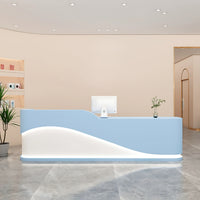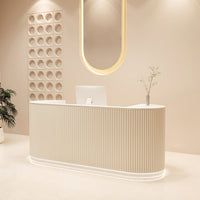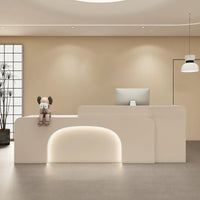What is the Height of a Reception Desk?
kaguyasuContent Menu
● Understanding the Importance of Reception Desk Height
>> First Impressions and Professionalism
>> Ergonomic Considerations
>> Accessibility and ADA Compliance
● Standard Reception Desk Heights
>> Seated Reception Desks
>> Standing Reception Desks
>> Transaction Counter Heights
● Ergonomic Considerations for Reception Desk Height
>> Posture and Spinal Alignment
>> Arm and Wrist Position
>> Monitor Placement
● ADA Compliance and Accessible Design
>> Counter Height Requirements
>> Knee Clearance
>> Clear Floor Space
● Customizing Reception Desk Height
>> Adjustable-Height Desks
>> Modular Designs
>> Tailored Dimensions
● The Impact of Reception Desk Height on User Experience
>> Receptionist Comfort and Productivity
>> Visitor Accessibility and Inclusivity
>> Communication and Interaction
● Workplace Design and Reception Desk Height
>> Integrating with Office Aesthetics
>> Optimizing Space and Traffic Flow
● Conclusion
● Frequently Asked Questions
● Citations:
The reception desk is often the first point of contact in any office or business setting, playing a crucial role in shaping visitors' initial impressions and ensuring smooth daily operations. The height of the reception desk is a vital consideration, influencing not only the aesthetic appeal of the reception area but also the comfort, accessibility, and efficiency of both receptionists and visitors[1][6]. This article delves into the multifaceted aspects of reception desk height, exploring standard dimensions, ergonomic considerations, ADA compliance, customization options, and the impact of desk height on user experience and workplace design.

Understanding the Importance of Reception Desk Height
The height of a reception desk is more than just a number; it is a key determinant of the functionality and overall design of a workplace[1]. A well-chosen reception desk height can create a welcoming and professional atmosphere, while an ill-suited height can lead to discomfort, inefficiency, and even negative perceptions[1][2]. The ideal reception desk height balances accessibility for visitors, ergonomic comfort for receptionists, and integration with the overall office design[1].
First Impressions and Professionalism
The reception area is often the first space visitors encounter, making the reception desk a focal point that significantly impacts their initial impression[4][6]. A reception desk with an appropriate height conveys professionalism, attention to detail, and a commitment to creating a comfortable and accessible environment[2]. The right height can make the desk appear more inviting and approachable, encouraging positive interactions and setting a positive tone for the rest of the visit[4].
Ergonomic Considerations
Ergonomics plays a crucial role in determining the optimal height for a reception desk[1][2]. Receptionists typically spend extended periods at their desks, performing tasks such as typing, answering phones, and assisting visitors. A desk that is too low or too high can lead to poor posture, muscle strain, and discomfort, potentially resulting in long-term health issues[1][4]. Ensuring the desk height allows for a comfortable posture and promotes good spinal alignment is essential for the well-being and productivity of receptionists[1].
Accessibility and ADA Compliance
Accessibility is another critical factor in determining reception desk height[2][5]. Businesses must comply with the Americans with Disabilities Act (ADA), which sets specific guidelines for accessible design, including counter heights[5][6]. An ADA-compliant reception desk ensures that individuals with disabilities, particularly those using wheelchairs, can comfortably interact with the receptionist[5]. This not only fulfills legal requirements but also demonstrates a commitment to inclusivity and equal access for all visitors[6].
Standard Reception Desk Heights
While customization is often necessary to meet specific needs, understanding standard reception desk heights provides a useful starting point[3]. Common height ranges exist for seated desks, standing desks, and transaction counters, each serving different purposes and catering to various user preferences[3][5].
Seated Reception Desks
Seated reception desks are designed for receptionists who primarily work while seated[3]. The standard height for a seated reception desk typically ranges from 28 to 34 inches (71 to 86 cm)[3][7]. This height allows for a natural arm position for tasks such as typing and writing, promoting ergonomic comfort and reducing strain[2].
Standing Reception Desks
Standing reception desks, also known as stand-up reception desks, are designed for receptionists who prefer to work while standing[3]. The standard height for a standing reception desk is generally around 42 inches (107 cm)[3]. This height allows for easy interaction with visitors while maintaining a professional and welcoming presence[4].
Transaction Counter Heights
Transaction counters are higher surfaces incorporated into some reception desks, typically used for visitors to fill out forms, sign documents, or conduct transactions[5]. The standard height for a transaction counter usually falls between 42 and 48 inches (107 to 122 cm)[2][5]. This height provides a comfortable surface for standing visitors to perform tasks and facilitates face-to-face communication[4].
Ergonomic Considerations for Reception Desk Height
Creating an ergonomic reception area is crucial for the health, comfort, and productivity of receptionists[1][2]. Ergonomics involves designing the workspace to fit the user, minimizing strain and maximizing efficiency[1]. Several ergonomic factors should be considered when determining the appropriate height for a reception desk.
Posture and Spinal Alignment
Maintaining a good posture is essential for preventing back and neck pain[1]. The reception desk height should allow the receptionist to sit or stand with their back straight, shoulders relaxed, and head level[1]. For seated receptionists, the desk height should allow their feet to rest flat on the floor or on a footrest, with their knees bent at a 90-degree angle[2]. For standing receptionists, the desk height should allow them to stand tall without hunching or reaching[3].
Arm and Wrist Position
The position of the arms and wrists is another critical ergonomic consideration[2]. The reception desk height should allow the receptionist to keep their elbows close to their body and their wrists straight while typing or performing other tasks[2]. This helps prevent repetitive strain injuries such as carpal tunnel syndrome[1].
Monitor Placement
The placement of the computer monitor also affects the receptionist's posture and comfort[6]. The monitor should be positioned at arm's length, with the top of the screen at or slightly below eye level[6]. This helps prevent neck strain and promotes good posture[1]. The reception desk height should be chosen to accommodate proper monitor placement[4].
ADA Compliance and Accessible Design
Ensuring that a reception desk is accessible to individuals with disabilities is not only a legal requirement but also a fundamental aspect of creating an inclusive and welcoming environment[5][6]. The ADA sets specific guidelines for accessible design, including requirements for counter height, knee clearance, and clear floor space[5].
Counter Height Requirements
The ADA requires that at least one portion of the reception desk be no higher than 36 inches (91 cm) from the floor[5][6]. This allows individuals using wheelchairs to comfortably approach and interact with the receptionist[5]. The accessible portion of the desk should be clearly identified with appropriate signage[2].
Knee Clearance
In addition to counter height, the ADA also specifies requirements for knee clearance under the accessible portion of the desk[5]. There should be a minimum of 27 inches (69 cm) of vertical space from the floor to the underside of the desk, allowing wheelchair users to comfortably position their knees[5][6]. The knee clearance should extend at least 19 inches (48 cm) deep under the desk[5].
Clear Floor Space
The ADA also requires a clear floor space of at least 30 by 48 inches (76 by 122 cm) in front of the accessible portion of the desk[5]. This allows wheelchair users to maneuver and approach the desk comfortably[5]. The clear floor space should be free of obstructions and have a firm, stable, and slip-resistant surface[6].
Customizing Reception Desk Height
While standard reception desk heights provide a useful starting point, customizing the height to meet specific needs and preferences can enhance both functionality and user experience[4]. Customization options include adjustable-height desks, modular designs, and tailored dimensions to accommodate unique requirements[4][6].
Adjustable-Height Desks
Adjustable-height reception desks offer the flexibility to change the desk height to suit different users or tasks[4]. These desks can be raised or lowered with the push of a button, allowing receptionists to switch between sitting and standing throughout the day[2]. Adjustable-height desks promote ergonomic comfort and can help reduce fatigue and strain[4].
Modular Designs
Modular reception desks consist of separate components that can be arranged and configured to create a customized layout[8]. This allows businesses to tailor the desk height, shape, and size to fit their specific space and needs[8]. Modular designs also offer the flexibility to add or remove components as needed, making them a versatile option for evolving workplaces[5].
Tailored Dimensions
For businesses with unique requirements or specific design aesthetics, custom-built reception desks offer the ultimate level of personalization[4]. Custom desks can be designed to any height, width, or depth, allowing for seamless integration with the overall office design[2]. Customization also allows for the incorporation of specific features, such as storage solutions, cable management systems, and branding elements[6].
The Impact of Reception Desk Height on User Experience
The height of the reception desk significantly impacts the user experience for both receptionists and visitors[1]. A well-chosen desk height can enhance comfort, accessibility, and communication, while an ill-suited height can create barriers and negatively affect interactions[1][2].
Receptionist Comfort and Productivity
For receptionists, the desk height directly affects their comfort, posture, and productivity[1]. A desk that is too low or too high can lead to muscle strain, fatigue, and decreased efficiency[4]. Choosing a desk height that promotes good posture and allows for comfortable task performance is essential for maintaining a productive and healthy workforce[2].
Visitor Accessibility and Inclusivity
For visitors, the desk height affects their ability to interact comfortably and effectively with the receptionist[2]. An ADA-compliant desk ensures that individuals with disabilities can easily approach and communicate with the receptionist[5]. A desk that is too high can create a physical barrier, making it difficult for visitors to fill out forms, ask questions, or engage in conversation[1].
Communication and Interaction
The height of the reception desk can also influence the dynamics of communication and interaction between receptionists and visitors[2]. A desk that is at an appropriate height promotes eye contact and facilitates face-to-face communication, creating a more personal and engaging experience[4]. A desk that is too high can create a sense of distance and formality, hindering effective communication[1].
Workplace Design and Reception Desk Height
The height of the reception desk should be considered in the context of the overall workplace design[1]. The desk should complement the surrounding furniture and décor, creating a cohesive and visually appealing reception area[2]. The desk height should also be appropriate for the size and layout of the space, ensuring that it does not overwhelm the area or impede traffic flow[4].
Integrating with Office Aesthetics
The reception desk is often the first thing visitors see, making it a key element in shaping the overall aesthetic of the office[4]. The desk height should be chosen to complement the existing décor and reinforce the company's brand identity[6]. For example, a modern office might opt for a sleek, minimalist desk with a clean, contemporary design, while a more traditional office might choose a classic wood desk with ornate details[7].
Optimizing Space and Traffic Flow
The reception desk height should also be considered in relation to the size and layout of the reception area[5]. In smaller spaces, a lower desk might be more appropriate to avoid overwhelming the area, while in larger spaces, a taller desk might be necessary to balance out the scale of the room[4]. The desk should be positioned to allow for easy traffic flow, ensuring that visitors can move comfortably through the reception area without bumping into the desk or other furniture[8].
Conclusion
The height of a reception desk is a multifaceted consideration that impacts functionality, ergonomics, accessibility, and overall workplace design[1]. By understanding standard desk heights, considering ergonomic factors, complying with ADA guidelines, and customizing the desk to meet specific needs, businesses can create a welcoming and efficient reception area that leaves a lasting positive impression on visitors and supports the well-being and productivity of receptionists[2].

Frequently Asked Questions
1. What is the standard height for a reception desk?
The standard height for a seated reception desk is typically between 28 and 34 inches, while the standard height for a standing reception desk is around 42 inches[3][7].
2. How does reception desk height affect client experience?
Reception desks with an average height of 42 to 48 inches create a professional and approachable atmosphere[2][4].
3. What are the key considerations for balancing reception desk heights?
Key considerations include ergonomic comfort, visitor convenience, workspace efficiency, accessibility, and aesthetic integration[2].
4. What height should the accessible portion of a reception desk be, according to ADA guidelines?
The accessible portion of the desk must be no higher than 36 inches from the floor[5][6].
5. What are the standard dimensions for a reception desk?
Standard reception desks typically measure between 28 to 34 inches in height, with a depth of about 24 to 30 inches[7]. A common width is about 48 inches wide, but this can be adjusted based on the number of receptionists and the available space[7].
Citations:
[1] https://www.wbstone.com/info/what-is-the-recommended-height-for-a-reception-desk_i0080.html
[2] https://www.studioforma.ca/reception-desk-height/
[3] https://offisavvy.com/how-tall-are-reception-desks/
[4] https://officestock.com/en-ca/blog/standard-reception-desk-height
[5] https://offisavvy.com/the-ultimate-reception-desk-buyers-guide/
[6] https://www.bkmoffice.com/reception-desk-height-dimension/
[7] https://archicfurniture.com/blogs/furniture/receptionist-desk-size
[8] https://learningcentre.officeinteriors.ca/blog/reception-desk-101
[9] https://glenwoodoffice.com/reception-desk-height-and-dimensions-a-complete-guide/
[10] https://agileofficefurniture.co.nz/blogs/desks/dimensions-and-height-for-reception-desks
[11] https://www.pinterest.com/pin/80150068360078145/
[12] https://rosecityoffice.com/why-office-reception-desk-height-is-important
[13] https://fitmentcraft.com/products/reception-desk-i-osv4-001-3
[14] https://officestock.com/en-ca/blog/reception-desk-height
[15] https://www.dimensions.com/collection/reception-desks
[16] https://www.arteil.com.au/blog/why-standard-desk-height-matters/
[17] https://www.southernofficefurniture.co.uk/guest-reception-desk
[18] https://a1officefurniture.co.uk/blogs/news/the-importance-of-desk-height-in-maintaining-a-healthy-posture
[19] https://m2-retail.com/en-au/blogs/news/what-is-the-ideal-reception-desk-height
[20] https://kerkmann-bueromoebel.de/katalog/welcome-english.pdf
[21] https://m2-retail.com/blogs/news/the-role-of-ergonomics-in-office-reception-desk-design
[22] https://communityhealthpartnerships.co.uk/what-we-do/inclusive-design/interactive-tool/reception-desk/
[23] https://www.vari.com/desks-and-tables/standing-desks/
[24] https://cubicdesign.com.bd/shop/office-furniture/office-desks/reception-desk/ergonomic-reception-desk/
[25] https://officemantra.in/blog/choosing-perfect-office-reception-table-height-dimensions-design-tips
[26] https://www.archiproducts.com/en/products/office-desks/height-adjustable
[27] https://desergo.com/project/reception-area/
[28] https://www.spaceist.co.uk/blog/what-height-should-my-desk-be/
[29] https://alumni.ulab.edu.bd/?a=358873515
[30] https://youralterergo.com/5-ergonomic-tips-for-setting-up-a-receptionist-desk-or-point-of-sale-station/
[31] https://www.tradeindia.com/question-answer/how-high-should-a-reception-desk-be/
[32] https://www.freedmansonline.com/blogs/blog/reception-desk-height-and-dimensions-the-ultimate-guide
[33] https://www.receptioncountersolutions.com/pages/faqs
[34] https://www.cmd-ltd.com/advice-centre/ergonomics/choosing-desks-for-different-heights/
[35] https://www.tradeindia.com/question-answer/what-is-the-standard-size-of-the-reception-table/
[36] https://www.linkedin.com/pulse/office-furniture-faqs-your-questions-answered-kanoofficefurniture-3kgfc
[37] https://archicfurniture.com/blogs/furniture/ada-reception-desk-height
[38] https://albertaofficefurniture.ca/blog/3-essential-things-to-keep-in-mind-when-buying-a-reception-desk/
[39] https://www.desmon.com/en/where-positioning-the-reception-desk-in-an-office/
[40] https://www.southernofficefurniture.co.uk/the-complete-guide-to-reception-desks
[41] https://mdd.eu/en/reception-desks/
[42] https://www.k-log.com/product-mts-736ra
[43] https://www.frezza.com/en/front-desk-design-how-to-welcome-clients-with-the-perfect-reception-desk/
[44] https://www.officefurnitureonline.co.uk/office-desks/height-adjustable-office-desks/
[45] https://www.adco.com.au/reception-desks
[46] https://www.ki.com/products/category/tables/height-adjustable-tables/
[47] https://directoffice.com/office-reception-furniture-desk-dimensions-guide/
[48] https://www.k-log.com/buying-guides/reception-desks/



















